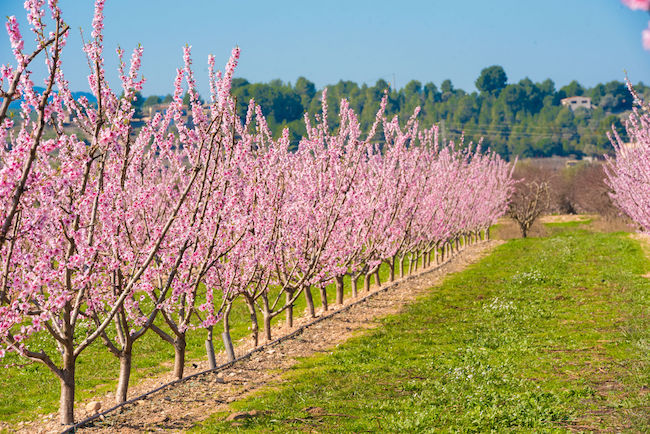
Our review committee has been hard at work. This year, we’ve selected 26 semifinalists from the 258 letters of intent we received. These semifinalists were selected based on specific criteria, including project feasibility, proposed objective(s), and regional impact. We’re pleased to announce that the following farms have been asked to continue the application process, in hopes of becoming a 2020 grantee:
Blue Yonder Organic Farm is a 20-acre, veteran-owned farm in North Salem, IN, that produces organic, pastured meats, eggs, shiitake mushrooms, honey, maple syrup, vegetables, berries, apples, and asian pears, which they sell through farmers markets and their online store. They requested $4,040 to add a medicinal and pollinator-friendly understory to their recently planted hedgerows.
Seafield Farm is a 1-acre farm in Cape Charles, VA, that grows a wide variety of vegetables and produces herbs, flowers, pecans, eggs, and honey. They requested $2,090 to upgrade to a drip irrigation system and purchase two hydrant water spigots. This would make their farm more efficient, saving water and electricity.
Slow Farm is a 47-acre farm in Cameron, NC, that produces eggs, mushrooms, and apples, which they sell wholesale and to a local farm-to-table restaurant. They also raise heritage kunekune piglets and Ancona ducklings for other farmers. Slow Farm also offers educational workshops and tours for fellow farmers and the public. Their programs combine sustainable agriculture, ecology, and creativity. They requested $4,843 to build a mushroom garden and mushroom cultivation classroom, including a rainwater collection system and more.
Sugar Hill Farmstead is a 10-acre farm in Hilo, HI, that produces pastured meats and eggs, raw honey, and organic bananas. The meat and some of their honey are sold through their CSA, the only meat CSA available on Big Island. The rest of the honey is sold online.The bananas are sold to a local smoothie shop or dehydrated and sold at another farm store. Sugar Hill Farmstead requested $4,351 to purchase two windmills to add to their current solar power system, which would allow them to decrease their reliance on generators.
Bittersweet Farm is a 80-acre farm in Heuvelton, NY, that grows transplants, perennial plants, cut flowers, vegetables, herbs, tree fruits, berries, and nuts. They also raise Scotch Highland cattle, St. Croix sheep, Tamworth hogs, and heritage chickens. Additionally, they produce their own line of herb mixes and jams. They sell their goods at farmers markets and to health food stores, local restaurants, and their local university. Last year, they started their Weekend Workshare Program, where community members can work with them to earn the equivalent of $15 per hour in food. Their program goal is to teach farming skills and to increase local food access for low-income families. Bittersweet requested $2,775 to expand this new program. They hope to expand their growing area for berries, herbs, vegetables, and flowers, and to purchase tools, boots, and gloves for Workshare members to use.
Mick Klug Farm is a 120-acre farm in St. Joseph, MI, that grows more than 30 varieties of fruit and vegetable crops. They sell at six weekly farmers markets in Chicago and to Chicago-based restaurants, breweries, and small grocery outlets. They requested $4,865 to establish hedgerows of native plants throughout the property, which would help support honeybees and other beneficial insects.
4MG Farm is a 11-acre farm in Sanger, TX, that produces a variety of pastured meats, eggs, herbs, and some vegetables, which they are currently expanding. They sell through social media and drop locations. They requested $4,614 to purchase and install a solar irrigation system in their deep well so that they can transition away from city water.
Across the Creek Farm is a 35-acre farm in West Fork, AR, that produces pastured pork and poultry, hay, and meat goats. Partnering with another local, farming family, they run an independent USDA poultry processing facility that serves other small farmers. They requested $3,705 to transition away from raising pigs. They’ve found that the pigs are causing soil erosion on their sloped farm. They hope to begin raising geese, which would be gentler on the land.
Comeback Orchards is a 10-acre farm in Asbury, NJ, that grows organic fruit, including apples, pears, Asian pears, plums, apricots, cherries, peaches, and nectarines, as well as organic vegetables, which they sell primarily at farmers markets. In addition, a portion of their crops are sold to restaurants and natural food stores, and they also sell organic jarred fruit butters. Comeback has requested $3,116 to further diversify their orchard by adding blueberries. They also hope to support native pollinators by starting Blue Orchard Mason Bee colonies and adding pollinator plots.
Coffee Pot Farms is a 1-acre farm in Winslow, AZ, that grows vegetables and seedlings. They requested $5,000 to set up a cold storage room on their farm and install a solar system to power it.
Shao Shan Farm is a 5-acre farm in Bolinas, CA, that grows organic Asian heritage vegetables, which they sell to Asian American chefs, grocery stores, and communities, as well as at the farmers market and to a local natural food store. They also donate some of their produce to their town’s “Free Food Fridays,” food pantries, Chinatown senior dinner programs, and bi-weekly gleaning. Shao Shan requested $4,881 to purchase a rotary mower for managing their cover crops and a hoop house to grow more heat-loving crops.
Schenk Homestead Farm is a 10-acre in Naples, NY, that grows a wide variety of vegetables, which they sell at farmers markets and to several local grocery stores and restaurants. They are also experimenting with a weekly produce box. They request $2,503 to add pollinator plantings to their farm to attract beneficial insects, start a small apiary, and purchase row cover to help with pest management.
Rancho Charanda is a 3-acre farm in Redlands, CA, that grows oranges, tangerines, lemons, avocados, sugarcane, chile peppers, and a wide variety of native foods, such as cactus paddles, prickly pear, xoconostle, and cholla.They requested $3,198 to purchase a water storage tank and replace their dated drip irrigation system.
Frecon Fruit Farms Inc. is a 75-acre farm in Boyertown, PA, that produces a wide variety of fruit. They sell at farmers markets and their own farmstand, as well as to small retailers, local schools, hospitals, food banks, and The FruitGuys Philadelphia! Frecon Requested $5,000 to purchase deer fencing to manage an increase in white-tailed deer in their area.
Dry Creek Farm is a 1-acre farm in Tahlequah, OK, that sells certified organic produce at their local farmers market and through a farm-to-school program. They requested $2,012 to transition part of their farm from a hog pasture to an orchard and vineyard. This would help provide habitat for pollinators and reduce erosion.
Thompson Creek Farm is a 2-acre farm in Newman Lake, WA, that grows a wide variety of vegetables, berries, and fruit, which they distribute through a CSA, local farmers market, and two local restaurants. They have been working to produce organic seeds and have plans to expand. They requested $3,592 to purchase owl and bat boxes to help with their pest issues, as well as a high tunnel to extend the season for their CSA and seed crops.
Grounded Earth Farm is a 1-acre farm in Crown Point, IN, that grows a variety of organic vegetables, fruits, and nuts. They also produce a variety of value-added products, such as jams, jellies, sauces, and breads. They requested $4,900 to complete a wash and pack building on their farm. This will drastically increase efficiency and reduce food waste. They hope to be able to participate in a mobile food market for a nearby, food-insecure community, once this project is complete.
Bee Warriors is a 10-acre farm in Ypsilanti, MI, that produces honey and bees for local beekeepers. They’re also heavily involved in educational programs. They teach for the Southeastern Michigan Beekeepers Association and mentor local beginners. They also have hives at St. Joes Hospital, where they help train veterans and donate what they need to get started. Bee Warriors requested $4,980 to purchase more nucs and equipment, so they can expand their Michigan bee-breeding program and continue their educational endeavors.
Black Trumpet Farm is a 2-acre farm in Leicester, NC that grows gourmet mushrooms and medicinal herbs, which they sell at farmers markets and to local restaurants, as well as two wholesale distributors. They also donate 25% of their medicinal herbs to non-profit herbal medicine collectives, like the Hawthorne Herb Collective and Maypop Herb Shop. Black Trumpet requested $4,274 to purchase a compost spreader, flail mower attachments for their BCS tractor, and a broadfork. These would help them efficiently improve their soil using no-till methods.
Skokomish Valley Farms is a 4-acre farm in Seattle, WA, that produces organic vegetables and eggs, which they distribute through three local restaurants and retreat centers, two local farmer’s markets, a 40-member CSA, the Skokomish Tribal Community, and two local food banks. They requested $4,214 to create an orchard, which would allow them to offer healthy fruit and nuts to their community and regenerate the soil in that area.
Morning Glory LLC is a 3-acre farm in Mt. Vernon, IA, that produces fruits and vegetables using organic practices, which they sell through a CSA, farmers markets, to local restaurants and a local college. They requested $5,000 to buy equipment and supplies to begin producing ready-to-eat salads, prepped vegetables, and frozen soups. They hope this project will provide employment opportunities for adults with disabilities.
Hollyaire Farm is a 40-acre farm in Junction City, OR, that produces a wide variety of fruits, vegetables, herbs, and eggs, which they sell at their farmstand, as well as wholesale to other local farms and businesses. They requested $3,650 to purchase two high tunnels, add 50 fruit trees to their orchard, and install bee, bat, and owl boxes to increase their production and encourage natural pest control and pollination.
Keya Wakpala Gardens is a 1-acre nonprofit in Mission, SD, that produces a wide range of vegetables, as well as eggs, and is expanding to produce honey. Their products are distributed at local farmers markets and across the Rosebud Indian Reservation, with their mobile market units. Excess produce is donated to different programs on the reservation, such as the Commodity Supplemental Food program, the Tree of Life Ministry, and the Adult Corrections Facility. Their goal is to teach interns and community members how to become producers. They requested $2,519 to purchase fruit trees, shrubs, a 3-inch chipper/shredder, cover crop seed, and a tilther tool. These supplies will help them transition to no-till growing and provide fruit in an area that’s considered a food desert.
The Giving Grove is a nonprofit in Kansas City, MO. A program that works through Kansas City Community Gardens, it establishes and supports holistic orchards in low-income neighborhoods, in partnership with area nonprofits, communities of faith, health agencies and more. Fruit from the orchards is made freely available to the local community and donated to food pantries. They requested $3,015 to create traps for Japanese beetles, which have become increasingly destructive to their orchards.
Bounty Community Farm is a 1-acre nonprofit in Petaluma, CA, that grows a variety of plants and produce. A large percent is donated to charity. They also provide nutrition incentives through local farmers markets, and their Sliding Scale Farm Stand, Farmacy, Community CSA, and Sponsor-A-Box. They requested $3,400 to purchase supplies necessary to add chickens to their operation. Chickens would allow them to offer eggs, add fertility, help with pest management, and play a key role in their educational programming.
Sankofa Community Farm is a 2-acre nonprofit in Philadelphia, PA. Their primary focus is on relationship-building through food. They produce over 100 vegetable varieties, focusing on culturally appropriate foods, like black-eyed peas, sorghum, okra, fish peppers, and callaloo, in serving West and SW Philadelphia’s predominantly African American community. They requested $4,982 to enhance their pollinator plant collection, add to their beehive infrastructure, and support related youth education lessons. They feel these improvements will help them to grow the next generation of environmental leaders, organic farmers, and beekeepers.
We have some amazing and inspiring farm applicants this year! They have been invited to continue into the next phase of the grant award selection and have been asked to submit an additional application, from which we will choose our winning finalists. Our dedicated review committee will have to make some tough calls in selecting up to 20 grants to be awarded. 2020 grantees will be notified by Friday, April 10, 2020.
Thank you to all the applicants who submitted letters of intent this year. We know your time is precious, and we thank you for your efforts in completing and submitting your worthy requests and proposals. Also, a huge thanks to our generous supporters who helped us to grow this year’s grant cycle capacity!
Please sign up for our monthly newsletter for updates.



